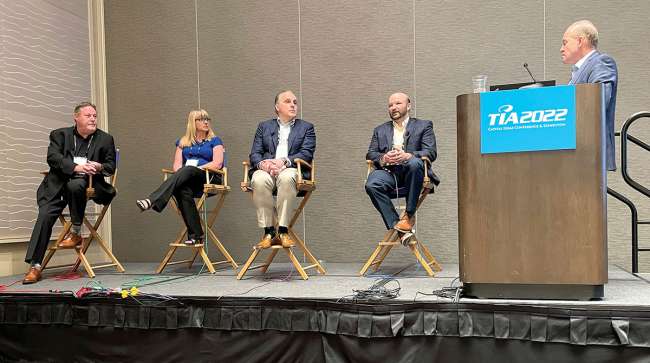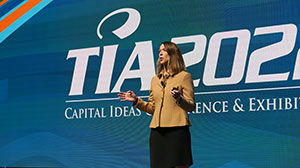Managing Editor, Features and Multimedia
Flexibility Key to Addressing Supply Chain Delays, 3PLs Say

[Stay on top of transportation news: Get TTNews in your inbox.]
SAN DIEGO — Closer collaboration and a willingness to find different ways to move freight are among the ways that third-party logistics providers have been navigating the supply chain disruptions, delays and scarce capacity that have characterized the past two years.
The coronavirus pandemic, inflation and now the war in Ukraine and surging oil prices have created “an enormously volatile environment” for 3PLs to manage for their customers, said Jim Damman, chairman at MODE Global Transportation.
“I’ve been in this business over 40 years, and I’ve never seen anything like it,” Damman said during an April 7 panel discussion at the Transportation Intermediaries Association’s 2022 Capital Ideas Conference & Exhibition.
Don't miss the Finding Solutions to Congestion & Delays in the Supply Chain with @MODETrans, @knichellogistic, @approvedfreight & @NATCOTransport as they discuss/share creative ways to help you & your customers navigate capacity issues https://t.co/JgxSJ5pHA4 #TIA2022CON #3PL pic.twitter.com/tlgkSxhhZ5 — Transportation Intermediaries Association (TIA) (@3PLAssociation) April 7, 2022
MODE Global, based in Jacksonville, Fla., ranks No. 22 on the Transport Topics Top 100 list of the largest logistics companies in North America.
To help meet the needs of its customers, Knichel Logistics increased the level of collaboration between its truckload, less-than-truckload and intermodal divisions.
“We’re looking at how to leverage all of our modes and having the groups work more cohesively together,” said Jon Krystek, the company’s chief operating officer.
In many cases, that has meant moving away from familiar processes to find better ways to move freight.
“We really had to challenge ourselves,” Krystek said.
Mark Christos, vice president of transportation at Matson Logistics, also emphasized the rising importance of supply chain collaboration.

(Seth Clevenger/Transport Topics)
MORE FROM TIA
In intermodal operations, he cited closer coordination among all partners, from dray carriers and railroads to shippers and receivers.
Improving utilization of intermodal container chassis at the ports, for example, can enhance efficiency for everyone, Christos said.
“Where is the equipment? How can we turn it quicker? The amount of capacity that can create is significant,” he said.
Matson Logistics, based in Concord, Calif., ranks No. 70 on the TT100 logistics list.
Randy Tutor, vice president of sales at Approved Freight Forwarders, said 3PLs’ relationships with their carriers have become even more important during the disruptions of the past couple of years.
“The relationships that we had pre-COVID allowed us to have success, but during COVID … it’s been critical,” he said. “The way you get capacity in a lot of cases is based on your relationship with your carriers.”
Approved Freight Forwarders also has heightened its focus on margins and cost control.
When capacity was readily available prior to the pandemic, “it was easy to take on business that’s not necessarily making any money for you,” Tutor said.
More recently, after closely examining profitability by customer, lane and time frame, the company decided to walk away from some low-margin business opportunities.
“If cash is king, the margin has got to be the prime minister,” Tutor said.
In situations where capacity is slim, flatbed and heavy-haul logistics provider NATCO Transport has been able to accommodate freight by shifting it to a different trailer type, such as a step deck.
“Customers have been very receptive to that because they want to keep on track with their schedule,” said Cori Eckley, vice president at NATCO Transport.
Want more news? Listen to today's daily briefing above or go here for more info
The company also has been presenting multiple alternatives to its customers when a truck isn’t available. Those alternatives might not be ideal, but at least provide some options to keep freight moving.
Another focal point at NATCO has been reducing driver downtime at shippers’ and receivers’ facilities. The logistics company has been stressing the importance of loading and offloading time windows to its customers, Eckley said.
“It’s a ripple effect,” she said, because any delays can cut into the driver’s next load.




